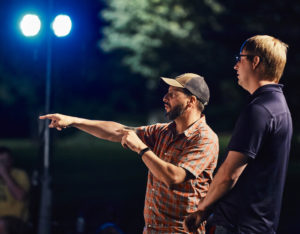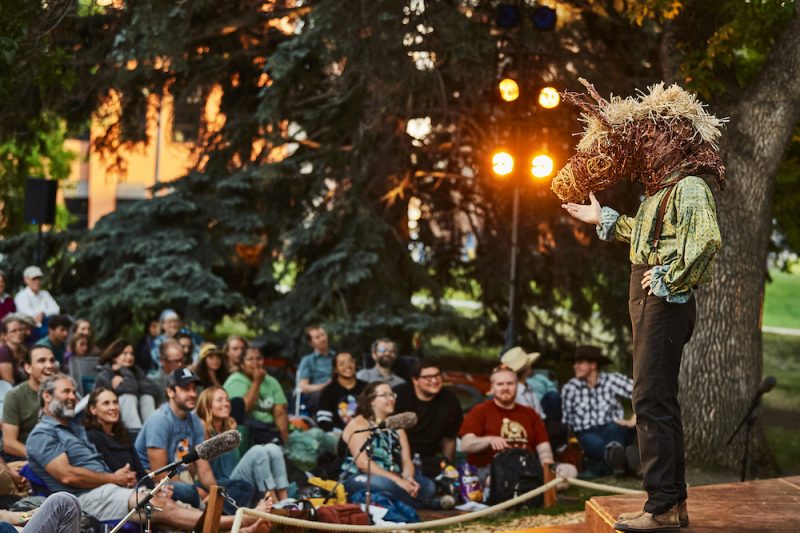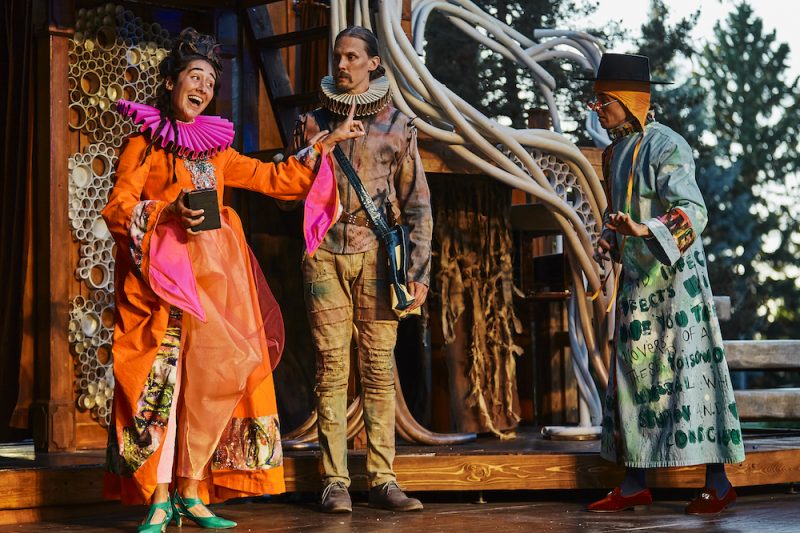A joyful and appreciative audience of around 700 people plopped blankets and lawn chairs around the Duck Pond at Montana State University June 16 for the return of Montana Shakespeare in the Parks. The beloved touring company that’s been delivering free performances of Shakespeare for nearly 50 years took a hiatus during the pandemic.
“I’ve been working in theater for well over 30 years and the energy of the audience on opening night was unlike anything I’ve ever experienced,” says Executive Artistic Director Kevin Asselin. It was a testament, he believes, to the resilience and power of live theatre.
Asselin adds that the best part of his job has been summoning actors back to work and reconnecting with tour coordinators across five states: “to hear their enthusiasm, to hear their relief.”

Montana Shakespeare in the Parks is renowned for bringing the bard to remote communities. “A lot of these towns are truly isolated,” says Asselin – especially in the eastern reaches of Montana. “It’s one thing to be isolated in a pandemic, it’s another thing to be isolated in an underserved community.”
The director was also delighted to call actors – many of whom were unemployed during the past year – and say, “‘I have a job for you.’ I couldn’t imagine being in their shoes with so much uncertainty, so much unpredictability.”
During the past year, the company has received an outpouring of support from fans around the country. In the age of COVID, gratitude has become a central theme, “first to be safe, to be healthy, to be here,” says Asselin. “And then to be able to be together … and bring people out in the way we’ve been able to.”
MSIP brings two productions to stages around the state this year and both, says Asselin, are pertinent to the times we’re living in.
“As with all of Shakespeare’s plays, the relevancy is palpable,” he says. “There are some hard moments throughout but we have to go through those hard moments to land at an ending where we have enlightenment, togetherness and forgiveness.”
“Cymbeline,” which Asselin directs, was the Bard’s final play, and is part of an international project called Cymbeline in the Anthropocene. As the title suggests, the eight companies around the world selected to participate in this project have crafted productions that explore the Anthropocene – “the period during which human activity has been the dominant influence on climate and the environment.”
To that end, the set design contrasts a dark, industrial world on one side and a lush, natural environment on the other. Asselin also takes a “gender-blind” approach to casting, and says the play has “a Grimm’s fairy tale feel,” as it elevates the theme of living with, and appreciating nature.
In “Cymbeline,” Britain is deeply divided, and the heroine – fearing for her life – disguises herself and begins a perilous journey full of fighting, cross-dressing, betrayal, long-lost heirs, and reconciliation. Along the way, forgiveness prevails amid uncertainty, miscommunication and the assumption of disloyalty.
Asselin notes that the play explores “the way in which people come together to forgive and pardon – which is particularly important during the last year. How can we listen to each other better? How can we communicate and be easy with our hearts to forgive and move forward?”
Christopher DuVal directs the perennial favorite, “A Midsummer Night’s Dream,” the story of four young lovers who find themselves in an enchanted forest at the mercy of a feuding fairy king and queen. As all discover, “The course of true love never did run smooth.”
While DuVal’s version of the romantic comedy takes inspiration from mid-1800s Europe, it also has influences from Asia, Greece and a purely imaginative realm. The play celebrates the potency of love and, like “Cymbeline,” the beauty and magic of the natural world.
On a personal level, Asselin says a year devoid of live theatre taught him some valuable lessons about the significance of acting before a live audience. The company, which is based out of Montana State University, “did a fair amount of work in the virtual sphere,” and Asselin performed in a play with a Chicago troupe.
“Oh my God,” he thought. “I’m acting to a little green dot on a computer screen – I can’t touch anything, I can’t affect anyone with my language, it’s not real time.”
So as actors filtered back and in-person rehearsals began, he found himself and his actors more present for the process.
“We really came together – we listened, we communicated, and I encouraged people to fail so that they could understand themselves and the story better,” he says. “I felt we could be more playful, more risky, more bold and – as a result – I’m excited about the gravity of these stories and how they’ll play in the towns that we’re serving.”
Of course, COVID-19 remains a consideration. The company worked closely with Bozeman Health, Gallatin Valley Health Commission and MSU to develop a set of safety protocols for both actors and audience. All of the actors who are traveling town to town this summer have been vaccinated, and they rehearsed “in a bubble.”
A newly hired company manager will serve as a conduit between MSIP and on-the-ground tour coordinators to help facilitate safety protocols, “keep our actors comfortable” and stay in touch with the administrative office.
“The greatest thing we have going for our organization is just being outdoors,” says Asselin. “My hope is that our communities … take individual responsibility and practice mindfulness in how they approach our parks and our performances this summer.”
– Kristi Niemeyer



